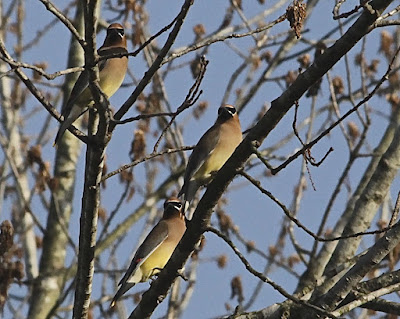This week in birds - #541
A roundup of the week's news of birds and the environment:
A trio of Cedar Waxwings looks down from a tree that will soon be fully leafed out. And soon enough the waxwings will be headed back north to their summer homes.*~*~*~*
The big environmental news of the week was that President Biden has decided to approve the controversial Willow oil project in Alaska. At the same time, he is declaring the Arctic Ocean off-limits to U.S. oil and gas leasing and announcing additional protections for the National Petroleum Reserve - Alaska, the nation's largest expanse of public lands.
*~*~*~*
Seaweed has suddenly become a "hot global commodity." But will it be able to thrive in a warming climate?
*~*~*~*
And speaking of seaweed, a giant blob of it, known as the great Atlantic Sargassum belt is drifting toward the Gulf of Mexico and may wind up on Florida's beaches this summer.
*~*~*~*
Forty years ago it looked like the California Condor was irrevocably headed toward extinction. But not so fast! Dedicated and determined conservationists brought it back from the brink. At least for now.
*~*~*~*
We've long been taught to beware of black widow spiders but it seems that they themselves are in danger from a relative called the brown widow which is displacing them in some areas.
*~*~*~*
The National Oceanic and Atmospheric Administration has announced that the weather pattern known as La Niña has ended and the opposite pattern El Niño could form as early as this summer.
*~*~*~*
Some researchers are claiming that the models used to project climate change are inaccurate and the rate of global warming may occur much faster than they show.
*~*~*~*
This little sprite is the Broad-billed Tody and it is the American Bird Conservancy's Bird of the Week. It is a resident of certain Caribbean Islands and nowhere else in the world.*~*~*~*
Among humanity's oldest partners and helpmates is the humble donkey. The family tree of that noble creature has now been revealed.
*~*~*~*
Pythons have been an extremely successful invasive species in Florida and are now headed farther north into the state.
*~*~*~*
A new book documents ten birds that have changed the world.
*~*~*~*
Candy stripers in hospital settings are selfless volunteers who give of their time to help others but candy stripers in Nature have eight legs and are not intent on helping anyone but themselves!
*~*~*~*
Nature's engineer, the beaver, through its activities helps many other creatures with whom it shares a habitat.
*~*~*~*
In Kentucky, a bill has been introduced that would relax mine pollution protections for endangered species.
*~*~*~*
Sunflower sea stars are huge 24-armed marine predators that help keep their ecosystems balanced. They are threatened with extinction and will soon have protection under the Endangered Species Act.
*~*~*~*
Avian flu apparently made its way from birds into seals along the Maine coast last summer, killing many of them.
*~*~*~*
A plan to reintroduce native species to an Australian forest was put on hold because of a single feral fox, but after four and a half years of hunting and not finding the fox, he is now being presumed dead.
*~*~*~*
California's elephant seals were once hunted to near extinction but have now made a remarkable recovery.
*~*~*~*
What is the cause of the recent spate of whale die-offs along the East Coast?
*~*~*~*
Sedimentation is filling up the world's dams and that is not a good thing.
*~*~*~*
Murmurations can be a protective strategy for birds. Here are some ducks employing it over Lake Erie to avoid capture by Bald Eagles.



Good morning, Dorothy, and thanks for the weekly chronicle on man's assault on the environment. It was disappointing to see Joe Biden approve the Willow oil project in Alaska, reversing his promise not to do so. But, I guess he's a politician after all, and principle has never been allowed to get in the way of political expediency.
ReplyDeleteA Thirsty Land is a very readable account of the water problems Texas faces. The author talks about the difficulties with dams in the book.
ReplyDeleteI passed along the links for the spider articles to the person in our naturalist group who is currently doing citizen science research into spiders in our county. Thank you!
Those pythons are everywhere in Florida! They seem a real problem. but what to do at this point?
ReplyDeleteThey seem to be an intractable problem.
DeleteSometimes after watching too many videos of ginormous pythons and alligators lollygagging hither and yon in Florida, I feel as though I wouldn't go out for my daily constitutional without a bazooka and an Apache helicopter as air support! But then... I think again of all their ridiculous legislation concerning censorship and other matters, and I know that I will never step foot in Florida with any of my hard-earned money.
ReplyDeleteI cannot disagree!
Delete